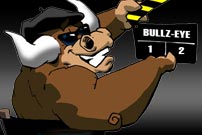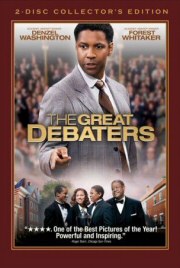 With the temperature dropping, it's time to find someone to keep you warm. Find your hookups with our online dating guide!
With the temperature dropping, it's time to find someone to keep you warm. Find your hookups with our online dating guide!
- Rated R
- Drama
- 2007
- Buy the DVD
All photos © The Weinstein Co.
Reviewed by Jason Zingale
()
enzel Washington is one of the most powerful actors in Hollywood. Unfortunately, his star power means nothing as a director, and though he’s proven himself behind the camera before, no studio is going to gamble millions of dollars without a little insurance. In the case of “The Great Debaters,” that insurance was Washington himself, who only agreed to star in the film in order to convince the studio to finance it. And it’s a good thing he did, because without the ever-charming Washington in the lead role, “The Great Debaters” would have been just another civil rights underdog film. Of course, with Oprah Winfrey attached as a producer, it’d be hard to classify the film as anything more.
The year is 1935, and as the new semester begins at Wiley College – a small, all-black university located in Texas – professor Melvin Tolson (Washington) has opened up tryouts for the school’s debate team. Of the 40 students that show up, only four are chosen: 14-year-old James Farmer Jr. (Denzel Whitaker), the son of an esteemed Wiley College professor (Forest Whitaker); rebellious but bright Henry Lowe (Nate Parker); bookish conservative Hamilton Burgess (Jermaine Williams); and the beautiful Samantha Brooke (Jurnee Smollett), the first woman member in the history of the school. No one expects much from the ragtag team of debaters, but as they begin to pick up wins against some of the more respected schools in the region, Tolson sets his sights higher by challenging Harvard to an end-of-the-year debate. Meanwhile, Tolson’s own extracurricular activities – namely his association with a southern farming union – land him in hot water with the town’s racist sheriff (John Heard), forcing one member to leave the team and jeopardizing the futures of the other three.
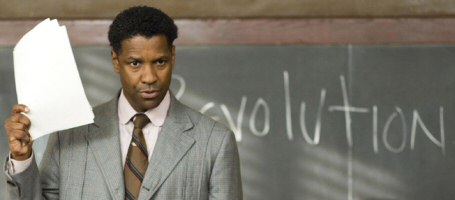
Though the movie begins a little too much like “Dead Poets Society”– Washington even jumps on top of a desk at one point – it quickly steers in another direction as the question of race is introduced into the fold. True, the events do pre-date a majority of the civil rights movement (and it’s not like we haven’t seen enough films addressing that particular issue in the past decade), but that doesn’t mean they weren’t somehow connected. In fact, several of the story’s characters went on to play a major role as civil rights activists; namely James Farmer Jr., who co-founded the Congress of Racial Equality when he was only 22 years old, and Melvin Tolson, whose poetry was greatly influenced by the Harlem Renaissance.
It’s exactly the kind of film you’d expect to find Winfrey’s fingerprints all over, but despite the ever-controversial subject matter, “The Great Debaters” fails in transferring the passion of the story to the big screen. For starters, debating is boring, and while “Rocket Science” at least made it look compelling by highlighting the motor-mouth speech method that contemporary debaters use, this film attempts to transform simple debates into Martin Luther King, Jr.-sized speeches.
A lot of responsibility is also thrust on the three young actors – especially when Washington’s character all but disappears in the final act – and, surprisingly, they’re much better off when he’s not around. Denzel Whitaker in particular steps up in a big way, and his scenes with the older Whitaker (to whom there’s no relation) are some of the film’s best. It’s too bad that we couldn’t have seen more of that father-son dynamic (or, for that matter, more scenes between Forest and Denzel), because that could have justified the film’s recent Golden Globe nomination for Best Picture. As it turns out, the only thing newsworthy about “The Great Debaters” is that a mediocre film managed to make the cut at all.
Two-Disc Collector's Edition DVD Review:
I’ll never understand why a movie like “The Great Debaters” is given the special edition treatment when there are so many other films that are more deserving. The extras that appear on disc one – deleted scenes and interviews with some of the real-life subjects (“A Historical Perspective”) – should be enough for most fans, but those willing to spend the extra dough will certainly get their money’s worth. The second disc includes four making-of featurettes (two on the film’s music, and two more on production and costume design), an inside look at the film’s debate camp (“Learning the Art”), as well as actor profiles on Forest Whitaker and his three young co-stars (“A New Generation of Actors”). Rounding out the set are two selections of poetry from Melvin B. Tolson and a pair of music videos.
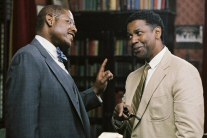 |
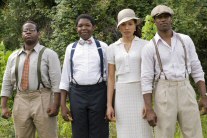 |
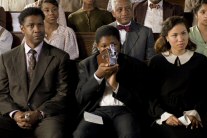 |
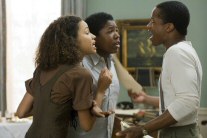 |
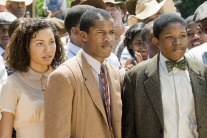 |
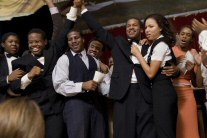 |
You can follow us on Twitter and Facebook for content updates. Also, sign up for our email list for weekly updates and check us out on Google+ as well.
